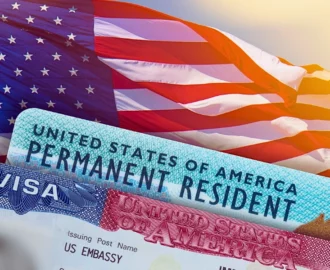A five-year-old migrant child’s recent death has illuminated concerns regarding immigrant access to healthcare in Chicago and across the U.S., with medical personnel alleging that migrant shelters are turning down their healthcare services when needed.

This is one of many stories leading people to question whether immigrants have fair access to healthcare when they need it most.
Migrant Child’s Death Leads to Questions About Healthcare
In December 2023, a five-year-old migrant child staying in a Pilsen shelter succumbed to an illness that was spreading through the shelter. The shelter in Pilsen is a temporary migrant shelter located on South Halsted, and multiple people at the shelter stated that the boy was one of several people in the shelter developing serious illnesses.
At this time, the exact cause of the child’s death is uncertain, but the Chicago Department of Public Health is investigating the death, while the Chicago Fire Department has revealed that four other people, including children, have received medical care outside the shelter to treat fevers. In addition, the Chicago Department of Public Health confirmed that multiple people at the shelter have developed chickenpox.
Although medical volunteers attempted to provide health services to people in the shelter, they have told reporters that the shelter refused their services. However, medical volunteer and physician Dr. Evelyn Figueroa told reporters that the shelter started allowing medical volunteers to provide services only after the child’s death.
As a result of this incident and many others, immigrant advocates are arguing that immigrants should have easy access to healthcare services whenever they’re required, long before deaths occur.
Immigrant Access to Healthcare
All immigrants in the U.S. should have access to healthcare services. However, the level of healthcare will vary depending on the immigrant’s status in the country.
Classifying Immigrants
First, it’s important to consider the different types of immigrants in the U.S. based on their situation.
One of the main types of immigrants is a migrant, which is someone who is capable of returning to his or her country of origin at any time. Meanwhile, asylum-seekers and refugees are individuals who are unable to safely return home, with refugees being individuals who are fleeing their home country due to violence, persecution, or other issues, while asylum-seekers move to the U.S. to benefit from a safe and secure environment when their country of origin doesn’t offer this protection.
Migrants may want to live in the U.S. for similar reasons to asylum-seekers and refugees as they seek safety and protection, but they may also enter the country with the desire to live and work in the U.S., increase their chances of succeeding in their careers, or other reasons that warrant migration.
Another category to consider is undocumented immigrants. These individuals won’t qualify for federal health insurance programs, including the Children’s Health Insurance Program, Medicaid, or Medicare. However, these immigrants are able to receive medical assistance from non-profit and public health centers and hospitals.
Healthcare: A Human Right in the U.S.
Migrants often face health crises upon or after entering the U.S., especially when they face higher risks of contracting illnesses from their country of origin through poor healthcare, diet, or other factors. Additionally, many migrants suffer from mental health issues.
Generally, healthcare is a human right in this country, and this applies to all types of immigrants, including undocumented immigrants. It’s among the immigration myths debunked that undocumented immigrants or others aren’t entitled to healthcare in the U.S. At the same time, you may struggle to get access to high-quality healthcare unless the government considers you a “qualified alien” or “qualified non-citizen.”
Qualified aliens fall under the following categories:
- Asylees
- Refugees
- Lawful permanent residents (LPRs)
- Battered noncitizens, parents, children, or spouses
- Entrants from Haiti or Cuba
- Trafficking victims
There are other types of lawfully present immigrants who qualify for more access to federal and state public benefits.
Undocumented immigrants have limited access to public health programs, but they may still receive care if they suffer from an “emergency medical condition.” These conditions could involve severe bodily impairment, serious conditions that jeopardize the individual’s health, and dysfunction of organs or body parts.
Factors Negatively Impacting Migrant Health in the U.S.
Several factors can cause health issues in migrants, leading to an urgent need for health services after entering the country.
For instance, migrants could encounter conditions affecting their health when actively migrating to the U.S. They might experience everything from dehydration and stress from extreme temperatures to exposure to illnesses en route when traveling.
Additionally, many migrant workers find employment in particularly high-risk industries, including agriculture, fishing, and forestry. These and other industries come with greater risk of injury and death, leading to a need for sufficient healthcare. Individuals working on farms could also experience exposure to various toxic chemicals that can increase their risk of illness and cancer. Farmworkers frequently face heat and cold stress when working in extreme temperatures, increasing the risk of heat stroke, exhaustion, hyperthermia, and other conditions.
Housing developments where migrants live could be unsanitary or otherwise unsafe for residents. Low-quality housing could lead to harmful chemical exposure, dangerous wiring and electrical systems, and poor maintenance that can lead to injuries.
Another issue could apply to access to food. Migrants may not have easy access to grocery stores or suffer from insufficient funds, and they may be unable to effectively cook in migrant housing units.
Getting Help From an Immigration Lawyer
If you’re struggling to get the healthcare you need, you may benefit from the help of experienced immigration legal services attorneys. The right attorney can help you get access to critical health services and safety-net programs based on your needs.
In addition, an attorney can provide you with other legal services to help you successfully integrate into the U.S. For instance, if there’s a backlog for pending immigration cases affecting your ability to process your immigrant application, an attorney may help accelerate the process, which will help give you faster access to health programs.
There are many ways you benefit from the help of a good attorney, including:
Help With Completing and Filing Paperwork
Immigrant applications and other documentation that helps you successfully immigrate to the U.S. must be accurate and complete. If you need assistance with completing or submitting your documentation, an attorney will work with you to help handle all paperwork.
Your attorney could confirm that your information is accurate and that you’re submitting all supporting documentation to help speed up the immigration process. In turn, you’ll benefit from smoother processing and avoid issues that could otherwise hold you back or even lead to deportation.
Personalized Guidance
Immigration attorneys provide fully personalized services based on your individual requirements. Your lawyer will work with you to understand your unique needs as an immigrant and help you approach your case the right way.
Help Obtaining Work Permits
You will need a permit to work in the U.S. as an immigrant. A lawyer will help you meet all requirements to qualify for a work permit, ultimately enabling you to acquire one. Otherwise, without legal help, you might make a mistake or neglect to include all necessary documentation, compromising your ability to work.
Take the Right Path to Citizenship
Not everyone will take the same road to gain American citizenship. Immigrants may need to go through processes that are more unique to them, enabling them to successfully work and live in the U.S. You might only see one possible option available to you, when there are actually several paths you can take.
If you require legal services from an immigration attorney, take some time to look for the ideal representation. Do research into multiple local attorneys, look at reviews and testimonials from past clients, and compare their services. Ask attorneys relevant questions during consultations to determine how the attorney can help you, including questions about past cases like yours, the likelihood of succeeding with your case, and the cost of representation.
Getting the Right Healthcare in Illinois
Migrants in Illinois and other states all over the U.S. may not get the access they need to reliable and adequate health services. However, migrants of all statuses qualify for a degree of healthcare when needed, which is why immigration attorneys work to ensure that access is available.
If you require healthcare as a migrant, you may get some assistance in this department from an attorney. A lawyer with experience handling similar cases to yours could help you secure the services you need, simplify the immigration process, and further help ensure you’re able to legally work and live in the country.




